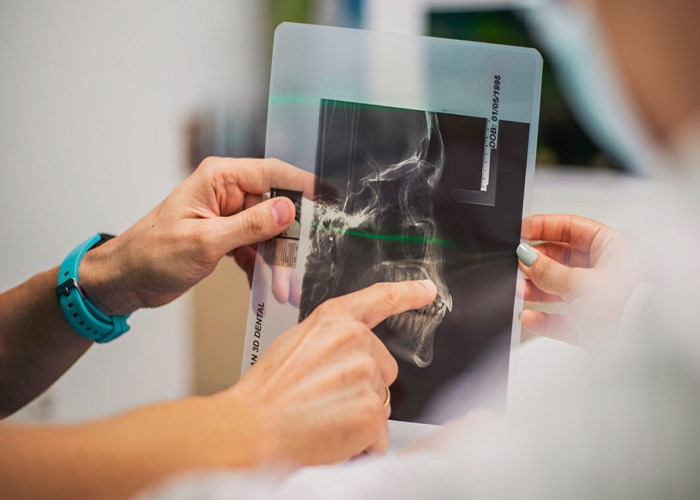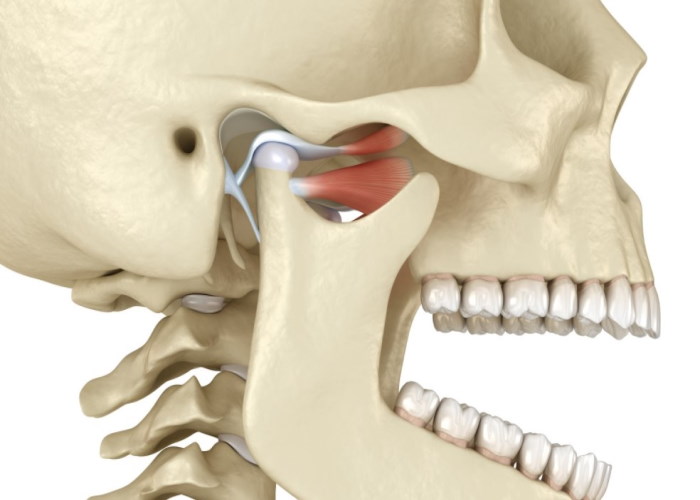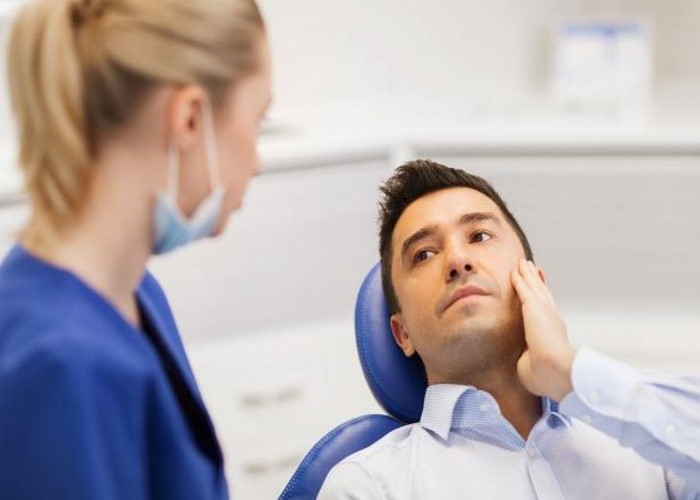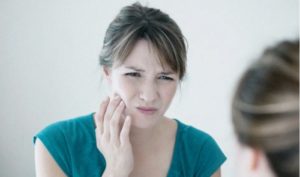The jaw is like a powerful clamp that can exert 50 to 250 pounds of force per square inch. It is the only joint in the human body that dislocates and relocates, allowing you to crush your food and swallow it to aid digestion. It operates in a smooth fashion and any problem that keeps the complex system of bones, discs, ligaments, and muscles from working properly may result in a painful disorder called TMJ. So if you ask “why does my jaw keep locking and popping?” there’s a good chance it’s related to your TMJ.
More about the human jaw
For most people, the first couple of things that come to mind when they think of the joints in the human body are the knees and hips, followed by ankles, elbows, wrists, toes and fingers. While these large joints support the body’s mobility, the most overlooked is also the most used joints, and the most important for human survival – the jaw joint.
The human jaw (mandible) is held by two joints (temporomandibular joints, or TMJ) on each side, along with several jaw muscles, ligaments, and the jawbone (lower jaw). The TMJ are sophisticated joints that allow complex movements like gliding and rotating actions, moving forward, backward, and side-to-side for chewing food, speaking, yawning, kissing, and even breathing. Each joint has a disc between the ball and the socket; the disc cushions the load while allowing the jaw to open as wide as possible (like a hinge action), glide, or rotate. It does so in a highly efficient fashion.
That clicking, popping, locking, you are experiencing is neither normal, nor healthy. In most cases, the locking and popping of the jaw comes with pain. In worse cases, pain can radiate from around the jaw joint area towards the neck and shoulders. Oftentimes, it comes with morning headaches.
What causes TMJ?
TMJ disorder (sometimes known simply as TMJ) is a dysfunction of the jaw joint. And since the jaw joint is quite complex, TMJ is also a complex disorder caused by multiple factors. There are even cases where no obvious causes can be found. Some of the common causes however, include:
- Autoimmune disease (the body’s immune cells attack healthy tissues)
- Trauma and injury to the jaw area
- Infections
- Dental procedures (opening of the mouth for prolonged periods of time)
- Various forms of arthritis
- Insertion of breathing apparatus for surgery (breathing tube)
There are also environmental, genetic, and hormonal factors that increase the risk of TMJ.
Subsequently, the observation that jaw joint problems are more prevalent among childbearing women is linked to the role of female hormones, such as estrogen.
Additionally, bad chewing and eating habits can cause the overuse and damage to the jaw joint, such as:
- Chewing gum too long and too often
- Grinding teeth
- Clenching of the jaw
- Biting fingernails (or other objects like pencils)
- Thrusting the jaw out
- Biting cheeks and lips
These bad habits can cause unnecessary wear and tear of the jaw joint, which can lead to erosion.
Who gets TMJ?
TMJ is actually quite a common condition that affects up to 12% of the US population at some point in their lives. While it is difficult to estimate, experts say there are 10 to 35 million people in the United States affected by TMJ problems at any given time.
While both men and women can get TMJ, the majority of the cases, particularly those with severe symptoms, affect women in their childbearing years. The ratio between men to women also increases with the severity of the symptoms. They say for every one man with chronic unrelenting pain and severe limitation to jaw movement, nine women suffer the same condition.
Should you be worried?
While locking and popping of the jaw are temporary symptoms, and can go away on their own without medication or treatment, they could also be a sign of a more serious condition that affects the function of the jaw. Some of these include:
- Dental malocclusion
- Misalignment can lead to malocclusion of the teeth, causing the jaw to pop. Examples of malocclusion include crowded teeth, crossbites, overbites, open bites, and underbites. Other symptoms for this cause include:
- Speech problems
- Breathing through the mouth
- Discomfort when biting and/or chewing
- Changes in facial appearance/feature
- Frequent biting of the tongue or inner cheeks
- Malocclusions are usually treated with braces or other orthodontic treatments.
Broken/dislocated jaw
If you have suffered an injury that caused you to break and/or dislocate your jaw, then this could be the culprit of the locking and popping of the jaw. Dislocation happens when the jaw joint becomes unhinged. Common causes for this factor include:
- Sports injuries
- Vehicular or industrial accidents
- Falling
- Physical assault
TMJ caused by broken or dislocated jaw may also come with
- Bleeding
- Bruising
- Numbness
- Swelling
Jaw pain caused by injuries must be treated as soon as possible to avoid further problems.
Arthritis
Not many people know this, but arthritis is not exclusive to the knees, hands, and fingers. Both rheumatoid arthritis and osteoarthritis can damage the cartilage of the jaw joint and affect the integrity and health of the TMH. The loss of cartilage makes movement of the jaw painful, this is because there is not enough cushion to absorb the force of the jaw.
People with rheumatoid arthritis may also experience anemia, tiredness, and loss of appetite.
Common symptoms for osteoarthritis include stiffness and pain in the joint area, which in case of the jaw joint, limits its range of motion.
Sleep apnea
Jaw locking and popping can also be caused by Obstructive Sleep Apnea (OSA) and Central Sleep Apnea (CSA). Characterized by snoring, sleep apnea (OSA) disrupts and often stops the normal breathing pattern during sleep. This happens because of restricted airflow from the throat to the lungs. As a result, people with chronic snoring often jolt in their sleep, or wake up to catch their breath.
Other symptoms of OSA include:
- Morning headaches
- Leg swelling
- Sluggishness and excessive daytime sleepiness
- Depression
- People with CSA have trouble breathing normally, this is because their brain can not signal the muscles that control the breathing accurately, causing them to top breathing periodically during sleep. With that said, they also experience:
- Difficulty swallowing
- Generalized weakness
- Changes in voice and speech patterns
Other health problems that could be associated by locking and popping of the jaw include:
- Myofascial pain syndrome – Chronic pain in the musculoskeletal system. Pain is usually localized, and myofascial pain syndrome in the jaw causes the jaw to lock and pop.
- Infection – Infections in the parotid glands (inside each cheek), submandibular glands (below the jawbone), and sublingual glands (glands under the tongue). This can be characterized by dry mouth, pus in the mouth, facial pain, swelling of the face and neck, or a foul taste in the mouth. Salivary gland infections must be treated as soon as possible.
- Tumor – Oral cancer can impact the function of the jaw and can develop in the lips, cheeks, gums, tongue, hard and soft palate, and floor of the mouth.
As said earlier, jaw locking and popping may seem harmless and may go away on its own. However, it could also be a sign of something serious. Thus, it is best to have it diagnosed and addressed as soon as possible.


























